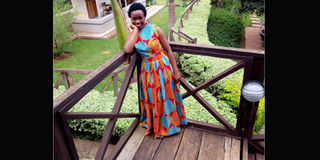TAKE5: Winnie Nchogu

Winnie Nchogu took part in the production of Brazilian biopic, Gabriel and the Mountain, directed by renowned Brazilian film director Fellipe Barbosa. PHOTO| FILE| NATION MEDIA GROUP
What you need to know:
- I wanted to tell untold stories through photography. My older sister is a filmmaker, but I was interested in topical subjects, hence journalism.
- Production coordinators and line producers and are the people who deal with logistics for the film. I managed money and resources.
- The film opened at Cannes and went ahead to win two awards at La Semaine de la Critique (created in 1962 by the French Union of Film Critics as a parallel section of the Cannes Film Festival).
Winnie Nchogu is a 27-year-old UoN Journalism graduate who works in the field finance. Last year, she took part in the production of Brazilian biopic, Gabriel and the Mountain, directed by renowned Brazilian film director, Fellipe Barbosa.
She worked alongside her sister, Vincho Nchogu, who was one of the producers. The film opened at Cannes Film Festival this year, where it won two awards.
1. Has this been a long-held dream, to work in film? How did you then move from journalism to finance?
Not really. I wanted to tell untold stories through photography. My older sister is a filmmaker, but I was interested in topical subjects, hence journalism. My concentration was broadcast journalism. I switched to finance when I realised that not so many people in the arts understand finance, yet for arts to be sustainable, we need to manage them financially.
2. You were a production coordinator on the set of Gabriel and the Mountain; what exactly does a production coordinator do? Is there a course you have to take to become one?
Production coordinators and line producers and are the people who deal with logistics for the film. I managed money and resources. My background in journalism and finance makes me a good candidate for any producer roles.
3. Do you and your sister, who also produced the film, work together often? Do you bore everyone at family functions talking about work?
We collaborate on specific projects. My sister is based in New York, where she is a full-time filmmaker, though she often works on the continent. I am her go-to person when she shoots in Kenya. Thankfully, all my family are creatives, so we have fun talking film and art. Also, we rarely talk about films that have been made, instead, we brainstorm about films that should be made, so nobody feels isolated.
4.This film got quite a bit of international attention. What was your experience like working with Fellipe Barbosa? What did you learn from it?
The film opened at Cannes and went ahead to win two awards at La Semaine de la Critique (created in 1962 by the French Union of Film Critics as a parallel section of the Cannes Film Festival).
La Semaine de la Critique focuses on discovering new talent and revealing first and second feature films. It was interesting to see Fellipe Barbosa in action. He was completely immersed in the project. That kind of passion is rare, so I learned a lot about committing 150 per cent - because he was so committed, every person on the crew gave their all. This film is something Kenyans and Africans should be proud of. It showcases Africa in a
three-dimensional way.
5. What has your attention at the moment? You are also in the process of preserving and archiving folktales from around the world. How is this going and what was the inspirationbehind this project?
I am currently working for Manga HEART. It is a local community-based organisation that focuses on orphans and vulnerable children, and also creates awareness about FGM in Nyamira County.
This is an important subject for me. As for the folktales project, it will be like a Wikipedia for folklores. Anybody will be able to get on the site and upload their grandmothers telling stories. Think of this project as a mixture of Wikipedia and StoryCorps.
We however go further by animating some of the stories.




